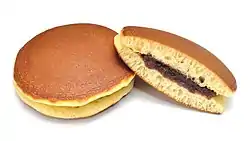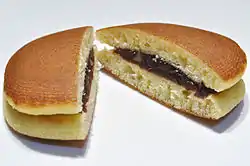銅鑼焼き
Japanese

銅鑼焼き (dorayaki): a whole dorayaki cake.
| Kanji in this term | ||
|---|---|---|
| 銅 | 鑼 | 焼 |
| どう > ど Grade: 5 |
ら Hyōgaiji |
や Grade: 4 |
| irregular | on’yomi | kun’yomi |
| Alternative spellings |
|---|
| 銅鑼燒き (kyūjitai) 銅鑼焼 どら焼き |
Etymology
Compound of 銅鑼 (dora, “gong”) + 焼き (yaki, “baking, roasting”, the 連用形 (ren'yōkei, “continuative or stem form”) of verb 焼く yaku, “to bake, to roast”), from the way the shape of the two cake pieces resembles a classical gong.[1][2][3]
Noun
銅鑼焼き • (dorayaki)
- a kind of confection consisting of two small cakes baked to resemble gongs, sandwiching a filling of sweet azuki bean paste
References
- Shōgaku Tosho (1988) 国語大辞典(新装版) [Unabridged Dictionary of Japanese (Revised Edition)] (in Japanese), Tōkyō: Shogakukan, →ISBN
- Matsumura, Akira, editor (2006), 大辞林 [Daijirin] (in Japanese), Third edition, Tōkyō: Sanseidō, →ISBN
- Matsumura, Akira (1995) 大辞泉 [Daijisen] (in Japanese), First edition, Tōkyō: Shogakukan, →ISBN
This article is issued from Wiktionary. The text is licensed under Creative Commons - Attribution - Sharealike. Additional terms may apply for the media files.
